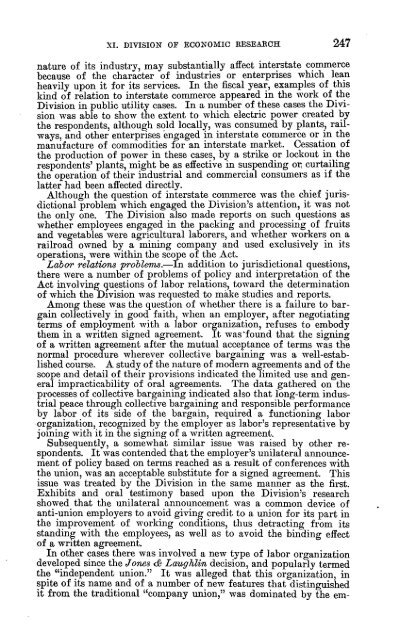NATIONAL LABOR RELATIONS BOARD
NATIONAL LABOR RELATIONS BOARD
NATIONAL LABOR RELATIONS BOARD
You also want an ePaper? Increase the reach of your titles
YUMPU automatically turns print PDFs into web optimized ePapers that Google loves.
XI. DIVISION OF ECONOMIC RESEARCH 247<br />
nature of its industry, may substantially affect interstate commerce<br />
because of the character of industries or enterprises which lean<br />
heavily upon it for its services. In the fiscal year, examples of this<br />
kind of relation to interstate commerce appeared in the work of the<br />
Division in public utility cases. In a number of these cases the Division<br />
was able to show the extent to which electric power created by<br />
the respondents, although sold locally, was consumed by plants, railways,<br />
and other enterprises engaged in interstate commerce or in the<br />
manufacture of commodities for an interstate market. Cessation of<br />
the production of power in these cases, by a strike or lockout in the<br />
respondents' plants, might be as effective in suspending or curtailing<br />
the operation of their industrial and commercial consumers as if the<br />
latter had been affected directly.<br />
Although the question of interstate commerce was the chief jurisdictional<br />
problem which engaged the Division's attention, it was not<br />
the only one. The Division also made reports on such questions as<br />
whether employees engaged in the packing and processing of fruits<br />
and vegetables were agricultural laborers, and whether workers on a<br />
railroad owned by a mining company and used exclusively in its<br />
operations, were within the scope of the Act.<br />
Labor relations problems.—In addition to jurisdictional questions,<br />
there were a number of problems of policy and interpretation of the<br />
Act involving questions of labor relations, toward the determination<br />
of which the Division was requested to make studies and reports.<br />
Among these was the question of whether there is a failure to bargain<br />
collectively in good faith, when an employer, after negotiating<br />
terms of employment with a labor organization, refuses to embody<br />
them in a written signed agreement. It was 'found that the signing<br />
of a written agreement after the mutual acceptance of terms was the<br />
normal procedure wherever collective bargaining was a well-established<br />
course. A study of the nature of modern agreements and of the<br />
scope and detail of their provisions indicated the limited use and general<br />
impracticability of oral agreements. The data gathered on the<br />
processes of collective bargaining indicated also that long-term industrial<br />
peace through collective bargaining and responsible performance<br />
by labor of its side of the bargain, required a functioning labor<br />
organization, recognized by the employer as labor's representative by<br />
joining with it in the signing of a written agreement.<br />
Subsequently, a somewhat similar issue was raised by other respondents.<br />
It was contended that the employer's unilateral announcement<br />
of policy based on terms reached as a result of conferences with<br />
the union, was an acceptable substitute for a signed agreement. This<br />
issue was treated by the Division in the same manner as the first.<br />
Exhibits and oral testimony based upon the Division's research<br />
showed that the unilateral announcement was a common device of<br />
anti-union employers to avoid giving credit to a union for its part in<br />
the improvement of working conditions, thus detracting from its<br />
standing with the employees, as well as to avoid the binding effect<br />
of a written agreement.<br />
In other cases there was involved a new type of labor organization<br />
developed since the Janes & Laughlin decision, and popularly termed<br />
the "independent union." It was alleged that this organization, in<br />
spite of its name and of a number of new features that distinguished<br />
it from the traditional "company union," was dominated by the em-

















